THE latest community news from Aberystwyth
Bridge club
RESULTS from 3 January: 1 Jeff Thomas and Mike Jones; 2 Diane Callaway and Bryan Limmer; 3 Robert Griffiths and Margaret James.
5 January: 1 Roger Boyle and Jeff Thomas; 2 Pamela Woodhouse and Margaret James; 3 Herbie Rowley and Robert Griffiths.
10 January: 1 Roger Boyle and Jeff Thomas; 2 Anita Owen and John Holmes; joint 3 Dai Hayes and Keith Bellamy/Alan Stein and Margaret James.
12 January: 1 Alan Stein and Gill Howells; 2 Elenid Thomas and Pamela Woodhouse; 3 Margaret James and Pat Roe.
17 January: 1 Ian Finlay and Mike Yeo; 2 Alan Stein and Dai Hayes; 3 Sue Sherman and Pamela Woodhouse.
19 January: 1 Dai Hayes and Alan Stein; 2 Roger Boyle and Jeff Thomas; 3 Mair Jenkins and Jean Harrison.
If you would like to learn to play bridge or would like to have refresher lessons, contact Jeff Thomas on 01970 828765.
Ramblers
FOR the walk on 8 February, meet at 8.50am at stand 4 Aberystwyth bus station to catch T2 bus at 9am to Machynlleth, alternatively meet outside Y Plas at 9.50am (grid ref SH745005).
The walk is a grade C+, and is a distance of seven miles. This is a circular walk going south along Glyndwr’s Way starting up the Roman steps. A brief diversion to Glanmerin Lake and up to Mynydd Bach. They will return via Glanmerin and Coed Cae-ty. This does involve fording a stream. If there has been a lot of rain an alternative path maybe required.
Return by bus to Aberystwyth.
Contact Penny Miller on 01970 627379.
No dogs except assistance dogs.
Rotary club
THE International League of Nations’ visit to Aberystwyth was the subject of a talk by Elgan Davies to last week’s meeting.
He started with an outline history of the League’s formation at the end of the First World War. Inspired by US president Woodrow Wilson, the league was established ’to guarantee the political independence and territorial integrity of states’.
In Britain, the league’s activities were mainly financed by David Davies of Llandinam - businessman, benefactor and former MP for Montgomeryshire.
The attitude of many Welsh people towards the war changed following the 1918 National Eisteddfod at Neath, and David Davies suggested the formation of a Welsh League of Nations Union, saying that Wales as a nation had a role to play in the campaign for world peace. To further these aims, his sisters Gwendoline and Margaret Davies gave £20,000 (£1.5m in today’s money) to the University College of Wales, Aberystwyth (as it then was) to create a Department of International Politics . the first such academic department in the world, with an endowed headship titled the Woodrow Wilson Chair.
David Davies also set up an endowment fund to establish a Welsh National Council to further the ideals of the League, and was active in promoting its work throughout Europe.
After a series of annual conferences in major cities across the continent, Davies’ offer of Aberystwyth as the venue of the 1926 Congress was accepted. He arranged, at his own expense, a special train to bring 200 delegates from London to Aberystwyth. The conference was reported at length in the 2 July 1926 edition of the Cambrian News. Its main venue was the university hall, a large wooden building in North Road which was burnt to the ground in 1933.
The event included a pilgrimage to Tregaron, the birthplace of Henry Richard MP, the ’Apostle of Peace’, and concluded with a large public meeting at the hall, attended by over 2,000 people, during which the head of the German delegation, Count von Bernstorff, was heckled by a man in the audience.
As Elgan Davies said, "the long shadow of the First World War had fallen over the proceedings at Aberystwyth".
However, the League of Nations did not give up its intention of meeting in Germany, and in 1927 the Congress was held in Berlin.
Bibliographical group
THE advertised speaker was unable to attend the meeting on 28 January, but former secretary Dr Rhidian Griffiths agreed to speak at short notice on ’A Music Publisher in Victorian Wales’.
This was a sequel to a lecture the speaker had given to the group in 2002 on "The Master of Stationer’s Hall: Isaac Jones Music Publisher’. The subject of this lecture was Isaac Jones’ younger brother Daniel Lewis Jones (1841-1916), known by his bardic name Cynalaw.
Unlike some music publishers of the period, Cynalaw was himself a musician, as well as being an eisteddfod adjudicator and one of the founders of the short-lived Society of Welsh Musicians. Having been raised at Ystradgynlais and worked as a blacksmith on the railway, he settled in Briton Ferry around 1872, where he established himself as a printer and stationer. Although he published a variety of material . including a book of jokes . Cynalaw specialised in publishing music. Much of his output was music for Sunday schools and Bands of Hope, and he published the hymns of the 1904 Revival. Unlike his brother, he published more anthems than solo songs. He continued publishing after moving to Cardigan in 1910, while the printing business in Briton Ferry was continued by his son-in-law.
The lecture was accompanied by images of a number of Cynalaw’s publications, and the speaker had brought some of the originals for the audience to look at . some of them quite fragile. The talk was followed by an interesting discussion.
The meeting was held in the Four Seasons Hotel, where the group entertained the speaker to dinner afterwards.
The next meeting will be on Saturday, 22 February, at 11am in St Paul’s Methodist Centre, when Canon Patrick Thomas will speak about ’Medieval Armenian Illuminated Manuscripts’.
St David’s Church, Bath Street
SUNDAY, 9 February: 10.30am, Rev Eifion Roberts; no evening service.
Blood bikes
MEMBERS of the Aberystwyth group of Blood Bikes Wales were welcomed to the Garn Chapel, Bow Street, on Sunday morning, 26 January, to receive a donation on behalf of the pastorate.
Delyth Davies, their chair, presented a cheque for £680 to their representative, Mathew Leeman (see photo).
In his acceptance speech, Mathew explained the work of the charity, which includes transporting blood samples, baby milk, medicines or vital documents by bike to various hospitals throughout Wales.
The fact that people don’t often see the blood bikes around is probably because they operate mainly during the night and at weekends, when they provide an invaluable service at a considerable saving for the National Health Service.
Mathew gave a brief description of the various roles undertaken by the volunteers . from controller to fundraising and publicity, as well as the vital riders, of course.
For further information, visit their website: www.bloodbikes.wales or join their Facebook page: Blood Bikes Wales, Aberystwyth.
NHS Retirement Fellowship
ON 6 December Ceredigion branch members met at the Richmond Hotel for their annual lunch.
The next meeting will be on Monday, 10 February at the Waunfawr Community Hall when the speaker will be Anna Prytherch whose talk is entitled ’Rural Health and Community Care’.
Choral society
REGULAR Tuesday evening rehearsals for the society’s forthcoming spring concert on Saturday, 25 April, in the Great Hall, got underway in the Old Hall, Old College at 7.30pm on Tuesday, 21 January.
The main work being performed will be Mozart’s Coronation Mass which was composed in 1779, and is one of the most popular of Mozart’s settings of the Ordinary of the Mass.
It is a completely new work for most of the choristers but after only two rehearsals, they are really beginning to enjoy singing it.
The second rehearsal ended with conductor David Russell Hulme getting the choir to stand and sing the Kyrie, Gloria and Credo that they had been learning.
The work has already brought in five new singers to the choir, and there is still time for more new choristers in all voices to join.
Anyone interested should come to the Tuesday evening practices in the Old Hall, where they can be assured of a warm welcome.
The choir has a no auditions policy.
Further information is available from the chairman, June Wilson on 07852 188184.
Cymdeithas yr Aelwyd
LONA Jones oedd y cadeirydd nos Wener, 31 Ionawr, a’n gwestai oedd Eurwen Booth, cadeirydd Papur Sain Ceredigion.
Cawsom hanes sefydlu’r Papur Sain yn 1970, y cyntaf erioed yng ngwledydd y Deyrnes Unedig ar gyfer pobl gyda nam ar eu golwg.
Deunaw gwrandawr oedd yn ei dderbyn hanner can mlynedd yn ol. Heddiw mae’n cael ei anfon yn wythnosol ar go bach i 112 o wrandawyr, rhai y tu allan i Geredigion.
Mae Papur Sain yn dibynnu ar 60 o wirfoddolwyr sydd wedi eu rhannu’n dimau i ddewis eitemau, recordio, dyblygu a gweinyddu.
Maent yn cyfarfod yn Nghanolfan Rheidol a defnyddir amrywiaeth o bapurau lleol, yn Gymraeg ac yn Saesneg.
Ar derfyn y noson cyflwynwyd siec o £100 i Eurwen tuag at gynnal y Papur Sain sy’n wasanaeth mor bwysig i gadw’r deillion mewn cysylltiad a’r gymuned.
U3A
AT the January meeting, Fred Long spoke and projected information on cryptography and emphasized the importance of its use for software security to ensure data has not been corrupted or modified during transmission over a network.
He demonstrated the Caesar Cipher which was the earliest known and simplest ciphers. It is a type of substitution cipher in which each letter in the plain text is shifted a certain number of places down the alphabet.
Further scientific information and research published by Clifford Cocks 1973, and Robert Mceliece 1978, to mention just a few names, were quoted during an interesting talk. Questions and answers were given on the topic followed by refreshments.
The next meeting at the Morlan Centre on 20 February at 2.30pm will include a talk by Wil Troughton, the curator of photography at The National Library of Wales. The subject will be ’Evolution of the Public House in Aberystwyth’.
Meetings including refreshments continue until 4pm.
If you’re a member of a club, society or group, send your news to [email protected]
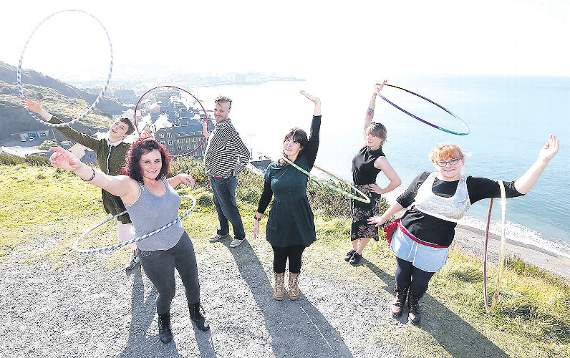
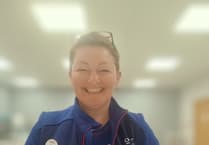
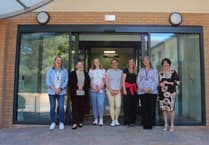
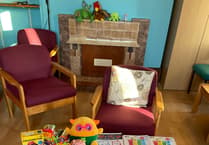
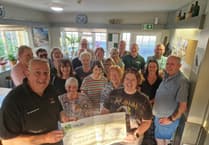
Comments
This article has no comments yet. Be the first to leave a comment.